Smart Campuses foster innovation and entrepreunership, which University of Dar es Salaam students approached by applying geospatial and ICT technologies in the MCL campaign in 2023. Read below the hihglights of the 8-week journey.
Story 1: Coming up with an umbrella challenge
The motivation behind the decision for the two umbrella challenges for two MCL campaigns conducted in 2022 and 2023 - The umbrella challenges needed to touch the society, their solutions are based on spatial data, information and communication technology systems and respective sustainable development goal(s) (SDGs). In addition, for the MCL 2.0 in 2023, an entrepreneurship and innovation criteria were added.
The MCL concept was not only new but also interesting and challenging in so many ways. Deciding on an umbrella challenge that can be relevant and engaging for students isn't easy. It took the team a lot of research and deliberation. We can't imagine anything more involving.
Of course, there was continuous support of the wider GeoICT4e project members, who provided their inputs from time to time through scheduled meetings. In the end, we had two umbrella challenges that, through the selection criteria, had a societal touch in terms of addressing the actual challenges (responding to the SDGs) as well as leading to students applying geospatial and tech skills in addressing them (this was the core of the challenge). Through this process, we arrived at our two umbrella challenges: Poor Conditions, Availability and Accessibility of Water and Sanitation Services in DSM (MCL 1.0, 2022) and Fostering Innovation and Entrepreneurship through Geospatial and ICT Technologies (MCL 2.0, 2023).
The Multi-Competence Learning (MCL) program is spearheaded by brilliant minds from universities in Tanzania and Finland. The visionary individuals behind this noble initiative have actively interacted with students in their roles as experts. In the case of the University of Dar es Salaam (UDSM), their continuous engagement and assessment of student's progress stand as the key factor contributing to students' remarkable achievements in the program.
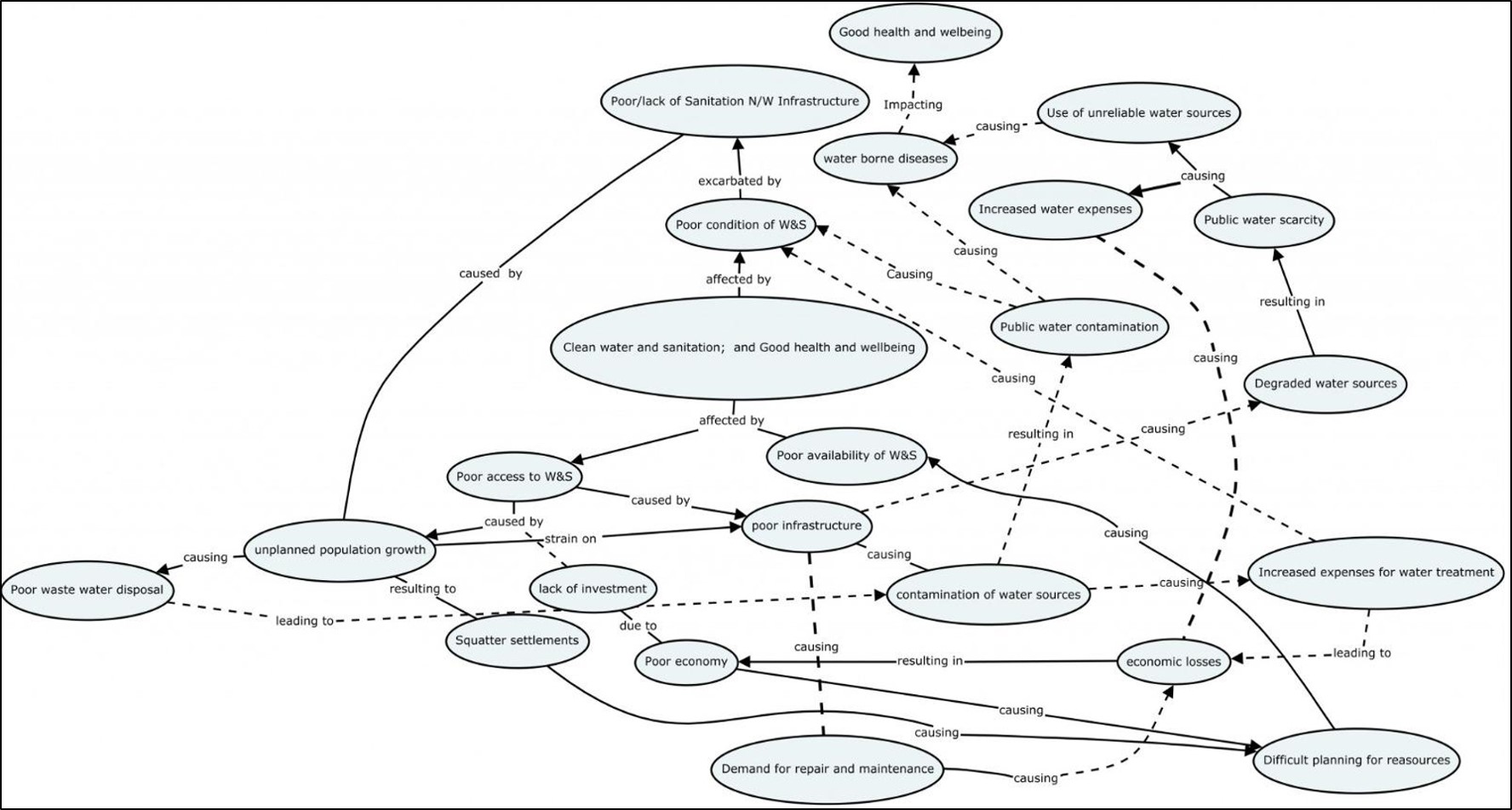
System Map for the umbrella challenge in MCL 1.0, 2022.
Story 2: Students' selection and groups formation
The University of Dar es Salaam was buzzing with excitement as news of the Multi-Competence Learning (MCL) program spread. Students saw posters on notice boards and heard about it on social media and from their teachers. The big task was to pick the right students for this unique program. It wasn’t easy because there were so many interested students, each with their own skills and eagerness to join. The challenge was to find students who were not just good in their studies but who also had different talents.
The department of Geography and College of Information and Communication Technology (CoICT) has a total of over 1500 students - we only needed 20 students for the program. We resorted to advertising the available slots requiring 10 students from Geography and 10 from CoICT. We also made the programme part of the Practical Training which is mandatory for all students as fulfillment of their programme requirements. This was done to attract them to join. We received many applications showcasing the success of our advertising strategy. To select 10 out of this lot, Geography had to consider those with better skills in GIS and remote sensing than others. For CoICT, the 10 slots were advertised in the Practical Training System, where gender, programme and year of study were specified in order to give equal opportunity to all.
Considering IT knowledge of students within the groups - The ICT students encompassed four distinct programs—Computer Science (CS), Business Information Technology (BIT), Computer Engineering and Information Technology (CEIT), and Telecommunications Engineering (TE). These students were evenly distributed among the five groups, a deliberate effort that yielded a valuable advantage due to the richness of perspectives and skills within this diverse cohort.
After the students were chosen, the next step was to form teams. The program needed to be multidisciplinary, and we had to find a way to get groups reflecting multidisciplinarity, gender balance, and technical capabilities. Forming groups was about making sure each team had a good mix of people. The creativity in student groups was demonstrated immediately after group formations where the groups in MCL 2.0 (2023) were GEOTECH ADROITS, GOAL DIGGERS, SMART SQUAD, GEOPRENEURS, and GEO BRAINIACS. This indicated great ambitions to come up with viable solutions to the challenge. Ultimately, the ambition behind the teams was vindicated by the great results that emerged.
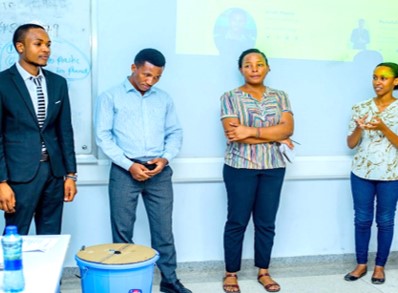
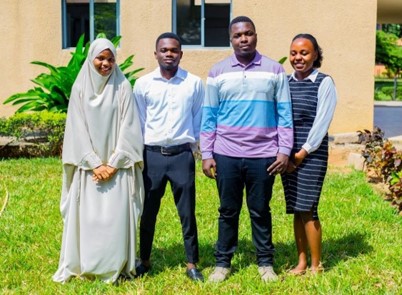
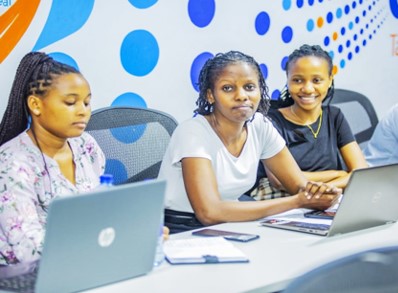
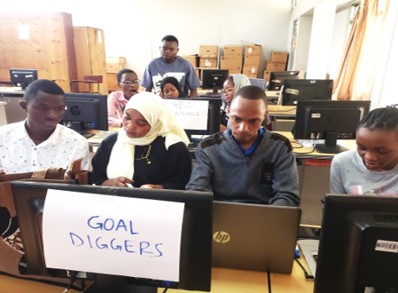
The 2023 MCL students' groups are, from top left, GeoTech Adroits, Smart Squad, and Geopreneurs in the lower left, and Goal Diggers and Geo Brainiacs in the lower right.
Story 3: Mentors' engagement
We needed mentors to guide students throughout the process and they played a crucial role in the overall execution of the program. Searching for mentors was a new thing for us and we had criteria set to identify suitable ones. Mentors were identified and selected based on experience - both technical and coaching skills. We also needed a mixture of staff, alumni and students to make a team of mentors. For mentors, this was also a new concept, so we provided support including training and a mentor manual. The success of the Multi-Competence Learning (MCL) program at the University of Dar es Salaam depended a lot on our mentors. These mentors were the guiding lights for our students throughout the program. Ms. Tukupala Mwalyolo, Mr. Julius Daniel, and Dr. Joseph Mayunga played key roles. They had the technical know-how in ICT and GIS and were deeply involved in the project-specific needs of the students.
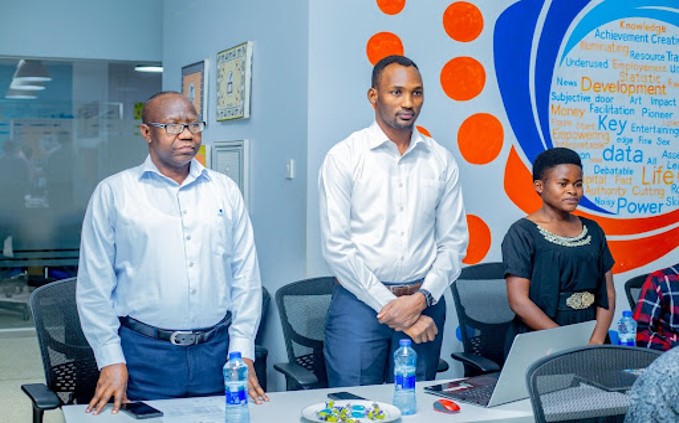
Mentors behind the success of MCL from left to right: Dr. Joseph Mayunga, Mr. Julius Daniel, Ms. Tukupala Mwalyolo
Before the program started, we made sure these mentors were ready. They went through a training program, which helped them understand how best to guide the students. They also had a mentor handbook, a kind of a map or guide to navigate this new and innovative journey. This handbook was essential because it helped the mentors stay on track and gave them the tools they needed to support the students effectively.Throughout the MCL program, Ms Tukupala, Mr. Julius, and Dr. Mayunga were always there, deeply engaged in every step. They worked closely with the students, understanding their challenges and guiding them through the complexities of their projects. Their dedication was remarkable; they were always available, making sure the students got the most out of the program.
In the end, not only did the students learn and grow, but the mentors did too. It was a journey full of challenges and learning for everyone involved. The mentors’ commitment and hard work played a huge part in the success of the program, and their impact was clearly seen in the progress and achievements of the students.
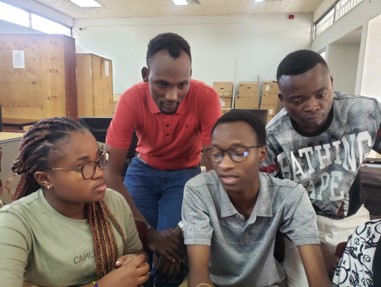
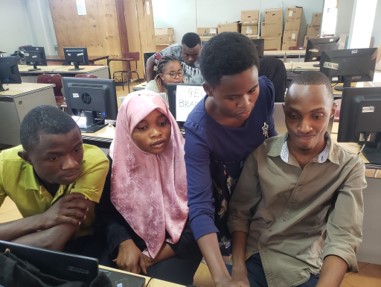
Our mentors Julius Daniel (left, in red shirt), and Tukupala Mwalyolo (right, in dark blue blouse), engaging with student groups in early weeks of MCL 2023, GeoICT4e challenge.
Story 4: Stakeholder engagement and participation
At the UDSM Identifying and engaging the right stakeholders was crucial. We needed partners who could present real-world challenges for our students to tackle, learn and benefit the community. Throughout the MCL program, stakeholders played a pivotal role. They were an integral part of the educational journey, setting the stage for real-world learning experiences and validating the relevance and effectiveness of the solutions.
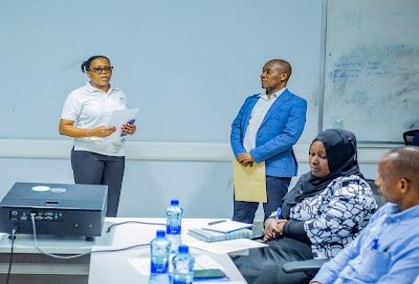
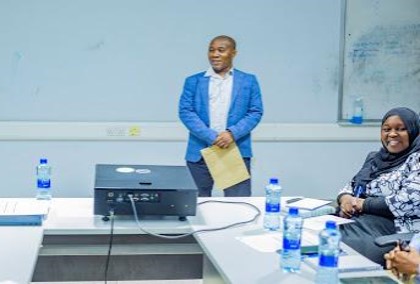
Left: GeoICT4e UDSM Coordinator, Dr, Mercy Mbise, introducing the CoICT Principal, Prof. Joel Mtebe, to the stakeholders. Right: Prof. Mtebe giving a welcome note to the stakeholders.
Stakeholders were invited using invitation letters and phone call follow-ups to make sure that they attended the stakeholder's workshop. Two stakeholder workshops were conducted per each MCL event. The 1st stakeholder's workshop was mainly for the stakeholders to validate students’ actionable problems. During the second stakeholders’ day, students’ solutions were validated by taking in more inputs for further improvements of their solutions. It is indeed exciting to say that some of the proposed solution prototypes were taken further by the students as their final year project proposals. The preparation for Stakeholders’ Days was thorough. Our teams worked hard to showcase the program's potential and its impact on both community issues and student development. The event was a success, with students actively engaging with stakeholders, gaining insights, and establishing long-term relationships. This interaction was crucial for later validating the students' solutions, ensuring they were practical and met the challenges posed.
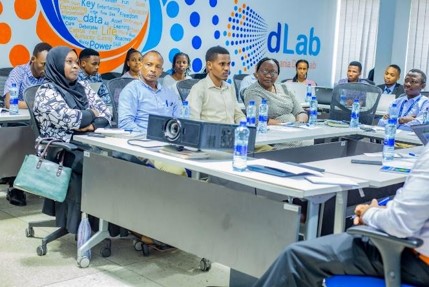
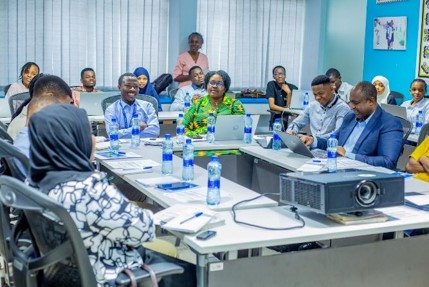
Cross sections of invited stakeholders in dLab innovation room.
At the heart of the MCL program lies a dynamic synergy between knowledge and experience, culminating in the creation of robust and sustainable solutions. Crafted by the visionary team at UDSM, the MCL programs place a premium on engaging stakeholders in the solution development process. Their keen involvement in tackling umbrella challenges proved instrumental in shaping the final solutions crafted by our MCL students. In this collaborative journey, the valuable input and wealth of experience provided by stakeholders enabled students to refine their solutions. This strategic engagement resulted in Sustainable and viable solutions that stand as a testament to the power of collective expertise like the ECOBIN connect solution.
For our students and experts, the MCL experience unfolds as a continuous cycle of engagement and learning. By actively tapping into the knowledge and experience of those intimately connected to the challenges at hand, the MCL program thrives on the collaborative spirit. The stakeholders' participation is not just an enhancement but a cornerstone, consistently adding value to the remarkable milestones we have achieved in our pursuit of excellence.
Story 5: Actionable problem - student case
Our initiative to infuse intelligence into the campus environment through this comprehensive challenge was driven by the desire to tap into the daily experiences and expertise of our students. These bright minds, with their diverse perspectives, generated compelling actionable problems, showcasing the depth of their creative thinking. Following an engaging stakeholder meeting, each of the five groups had the opportunity to conceptualize between the two actionable problems, ultimately selecting one that stood out as particularly promising.
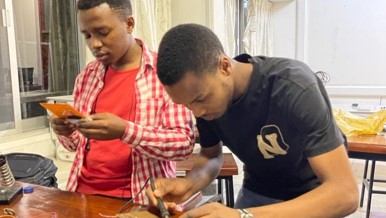
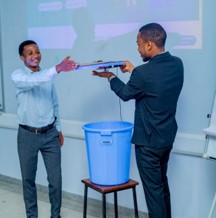
The making (left photo) and demonstration (right photo) of the smart dustbin (eco-bin collect), one of the outstanding solutions from 2023 MCL challenge.
The range of actionable problems spanned critical areas such as the provision of timely health services, student elections, waste management, and venue utilization. Although each presented a commendable solution, one emerged as the clear frontrunner, focusing on enhancing waste management in the university vicinity. The student experts championing this initiative proposed the innovative ECOBIN CONNECT solution. Their vision involved meticulously geolocating all university dustbins and introducing a smart bin equipped with sensors for efficient operation. The ingenious ECOBIN aimed to address the challenge of timely waste disposal by monitoring the fill levels and coordinating with contracted waste companies for timely emptying.
This groundbreaking technology not only proved to be an idea but also an effective solution, revolutionizing waste management practices across the University of Dar es Salaam campus. The success of this endeavor underscored the transformative potential of harnessing the intellectual prowess of our students in tackling real-world challenges.
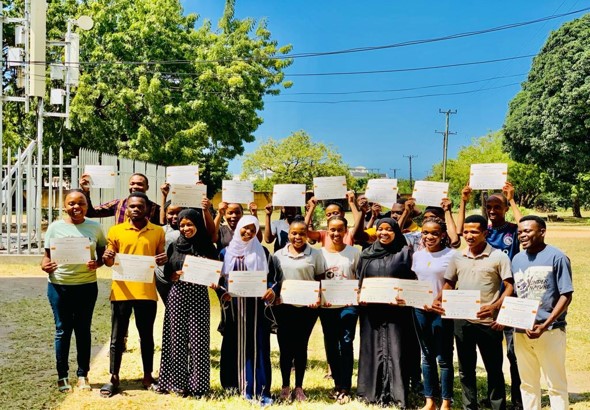
Students with certificates of completion on the last day of the MCL programme.